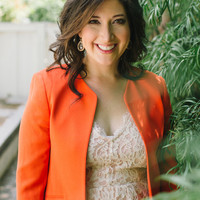Death, loss and mourning are not something often spoken of in the workplace — whereas breakups, bad news and other life-changing emotional turmoil are much more widespread and accepted on the job. Rebecca Soffer aims to change the dialogue — and perception — of grief.
And for that, I hail This Woman's Work.
Rebecca Soffer is the co-founder of Modern Loss and co-author of the forthcoming Modern Loss book on grief and resilience. She's also a former "Colbert Report" producer.
1) How did you choose to live loss out loud?
It wasn't an active choice. It was more like a survival tactic. Both of my parents died within a few years of each other. My mom died in a car accident, and my dad had a heart attack while traveling. I seriously doubt there's ever a good time to experience deep loss, but doing so during this life stage was beyond tough. I was in my early 30s, working full time in New York, dating, just trying to figure it all out, as so many of us still are at that age. It was so incredibly isolating. I was surrounded by great and well-meaning friends and co-workers, but they were understandably focused on building their lives, absorbing every experience possible, moving forward. And so was I, but I was also in the thick of grappling with suddenly losing my two best friends on the planet. I lost the only two people who loved me unconditionally.
For a few years, I had trouble being honest about the fact that my mom and then my dad were dead. When people I met in social situations asked where my family lived, I'd say "Philadelphia" because I didn't feel like telling the whole truth. I had to swallow a ton of platitudes along the way, like "she's in a better place" or "it takes a year," and didn't feel like opening myself up to more of that. I actually had first dates awkwardly peter out if I came clean. It was obvious that some people saw me as "that girl with dead parents" instead of just "Rebecca." It often felt like my responsibility to make people feel comfortable when I dropped that bomb. But eventually, going to so much trouble to pretend like a huge part of my reality wasn't the case — that I wasn't living with profound losses — became more of a chore than an avoidance tactic. I no longer had the energy to hide it. For my own sanity, I started talking about my loss in public. And I realized that if I took charge of the conversation, it didn't have to take on this dum-dum-dumm tone or end in public tears — though, OK, sometimes it did. It could just be folded into the dialogue as something that was a part of me — and in fact, most of the time, it ended up with the other person feeling comfortable to share their own experiences with me.
2) Why is discussing death so taboo in our culture?
Because we understandably do not want to think about our own lives ending or those of the people we love. I mean, there's enough to worry about on a daily basis — hello, election! — without throwing death into the mix. But the thing is, every single one of us is going to experience loss, because we all mean something to someone and every one of us is going to die. I always feel like the Grim Reaper when I say that, but it's the truth. Our take is, let's just normalize that conversation so that everyone can feel less isolated. I mean, look at all the crazy stuff we're discussing online. Why can't a topic that affects everyone be something that we're not scared to approach? Because then, when someone else goes through it, perhaps they won't feel stigmatized the way so many of us did.
3) How can we better express our condolences to acquaintances and co-workers? Are there any ethics in death?
Funny you asked! We actually have a terrific piece about this on the site. As I mentioned above, platitudes and unsolicited advice don't go far for most people. And personally, I think the worst thing someone can do — and when it's done, it's often done unwittingly — is to make someone feel like their loss is not a welcome topic of conversation by completely ignoring the fact that they've gone through something. Loss isn't contagious. Nothing bad's going to happen if you ask someone questions or just let them know you're there to grab a coffee or take a walk or whatever if they ever need to. Just make it clear that you know that things must be hard and leave it at that, without assuring them that they'll be OK. Because they will, but hearing that doesn't do much for them now.
Read more about Rebecca Soffer and Modern Loss at http://modernloss.com.
Randi Zuckerberg is the founder of Zuckerberg Media, a best-selling author and the host of a weekly business show on SiriusXM, "Dot Complicated." To find out more about Randi Zuckerberg and read features by other Creators Syndicate writers and cartoonists, visit the Creators Syndicate webpage at www.creators.com.






View Comments